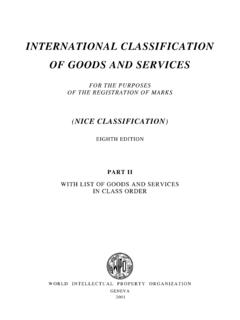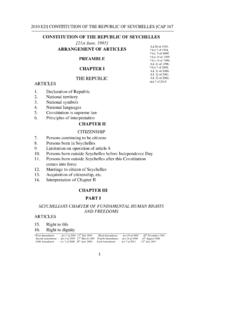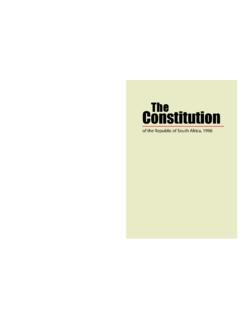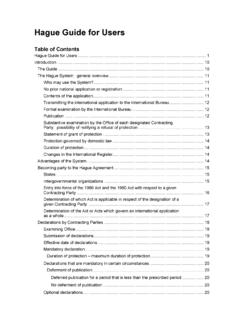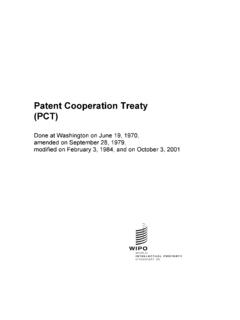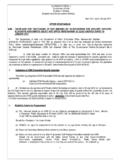Transcription of Labour Relations Act 1995 (Act No. 66 of 1995) - …
1 [0861 IMPLEX] Labour Relations ACT 66 OF 1995 (English text signed by the President) [Assented To: 29 November 1995] [Commencement Date: 11 November 1996 unless otherwise indicated] as amended by: Labour Relations Amendment Act 42 of 1996 Basic Conditions of Employment Act 75 of 1997 Employment Equity Act 55 of 1998 Labour Relations Amendment Act 127 of 1998 Labour Relations Amendment Act 12 of 2002 Intelligence Services Act 65 of 2002 Electronic Communications Security (Pty) Ltd Act 68 of 2002 General Intelligence Laws Amendment Act 52 of 2003 Prevention and Combating of Corrupt Activities Act 12 of 2004 ACT To change the law governing Labour Relations and, for that purpose - to give effect to section 27 of the Constitution; to regulate the organisational rights of trade unions; to promote and facilitate collective bargaining at the workplace and at sectoral level; to regulate the right to strike and the recourse to lock-out in conformity with the Constitution.
2 To promote employee participation in decision-making through the establishment of workplace forums; to provide simple procedures for the resolution of Labour disputes through statutory conciliation, mediation and arbitration (for which purpose the Commission for Conciliation, Mediation and Arbitration is established), and through independent alternative dispute resolution services accredited for that purpose; [0861 IMPLEX] to establish the Labour Court and Labour Appeal Court as superior courts, with exclusive jurisdiction to decide matters arising from the Act; to provide for a simplified procedure for the registration of trade unions and employers organisations, and to provide for their regulation to ensure democratic practices and proper financial control; to give effect to the public international law obligations of the Republic relating to Labour Relations ; to amend and repeal certain laws relating to Labour Relations ; and to provide for incidental matters.
3 ARRANGEMENT OF SECTIONS CHAPTER I PURPOSE, APPLICATION AND INTERPRETATION 1. Purpose of this Act 2. Exclusion from application of this Act 3. Interpretation of this Act CHAPTER II FREEDOM OF ASSOCIATION AND GENERAL PROTECTIONS 4. Employees right to freedom of association 5. Protection of employees and persons seeking employment 6. employers right to freedom of association 7. Protection of employers rights 8. Rights of trade unions and employers organisations 9. Procedure for disputes 10. Burden of proof. CHAPTER III COLLECTIVE BARGAINING Part A Organisational Rights [0861 IMPLEX] 11. Trade union representativeness 12.
4 Trade union access to workplace 13. Deduction of trade union subscriptions or levies 14. Trade union representatives 15. Leave for trade union activities 16. Disclosure of information 17. Restricted rights in the domestic sector 18. Right to establish thresholds of representativeness 19. Certain organisational rights for trade union party to a council 20. Organisational rights in collective agreements 21. Exercise of rights conferred by this Part 22. Disputes about organisational rights Part B Collective agreements 23. Legal effect of collective agreement 24. Disputes about collective agreements 25. Agency shop agreements 26. Closed shop agreements Part C Bargaining councils 27. Establishment of bargaining councils 28. Powers and functions of bargaining council 29.
5 Registration of bargaining councils 30. Constitution of bargaining council 31. Binding nature of collective agreement concluded in bargaining council 32. Extension of collective agreement concluded in bargaining council 33. Appointment and powers of designated agents of bargaining councils 33A. Enforcement of collective agreements by bargaining councils 34. Amalgamation of bargaining councils Part D Bargaining councils in the Public service 35. Bargaining councils in public service 36. Public Service Co-ordinating Bargaining Council [0861 IMPLEX] 37. Bargaining councils in sectors in public service 38. Disputes between bargaining councils in public service Part E Statutory councils 39.
6 Application to establish statutory council 40. Establishment and registration of statutory council 41. Establishment and registration of statutory council in absence of agreement 42. Certificate of registration of statutory council 43. Powers and functions of statutory councils 44. Ministerial determinations 45. Disputes about determinations 46. Withdrawal of party from statutory council 47. Appointment of new representative of statutory council 48. Change of status of statutory council Part F General Provisions Concerning Councils 49. Representativeness of council 50. Effect of registration of council 51. Dispute resolution functions of council 52. Accreditation of council or appointment of accredited agency. 53. Accounting records and audits 54.
7 Duty to keep records and provide information to registrar 55. Delegation of functions to committee of council 56. Admission of parties to council 57. Changing constitution or name of council 58. Variation of registered scope of council 59. Winding-up of council 60. Winding-up of council by reason of insolvency 61. Cancellation of registration of council 62. Disputes about demarcation between sectors and areas 63. Disputes about Parts A and C to F CHAPTER IV STRIKES AND LOCKOUTS [0861 IMPLEX] 64. Right to strike and recourse to lock-out 65. Limitations on right to strike or recourse to lock-out 66. Secondary strikes 67.
8 Strike or lock-out in compliance with this Act 68. Strike or lock-out not in compliance with this Act 69. Picketing 70. Essential services committee 71. Designating a service as an essential service 72. Minimum services 73. Disputes about whether a service is an essential service 74. Disputes in essential services 75. Maintenance services 76. Replacement Labour 77. Protest action to promote or defend socio-economic interests of workers CHAPTER V WORKPLACE FORUMS 78. Definitions in this Chapter 79. General functions of workplace forum 80. Establishment of workplace forum 81. Trade union based workplace forum 82. Requirements for constitution of workplace forum 83.
9 Meetings of workplace forum 84. Specific matters for consultation 85. Consultation 86. Joint decision-making 87. Review at request of newly established workplace forum 88. Matters affecting more than one workplace forum in an employer s operation 89. Disclosure of information 90. Inspection and copies of documents 91. Breach of confidentiality 92. Full-time members of workplace forum 93. Dissolution of workplace forum 94. Disputes about workplace forums CHAPTER VI TRADE UNIONS AND employers ORGANISATIONS Part A [0861 IMPLEX] Registration and Regulation of Trade unions and employers organisations 95. Requirements for registration of trade unions or employers organisations 96.
10 Registration of trade unions or employers organisations 97. Effect of registration of trade union or employers organisation 98. Accounting records and audits 99. Duty to keep records 100. Duty to provide information to registrar 101. Changing constitution or name of registered trade unions or employers organisations 102. Amalgamation of trade unions or employers organisations 103. Winding-up of trade unions or employers organisations 104. Winding-up of trade unions or employers organisations by reason of insolvency 105. Declaration that trade union is no longer independent 106. Cancellation of registration of trade unions or employers organisations Part B Regulation of Federations of Trade unions and employers organisations 107. Regulation of federations of trade unions or employers organisations Part C Registrar of Labour Relations 108.
